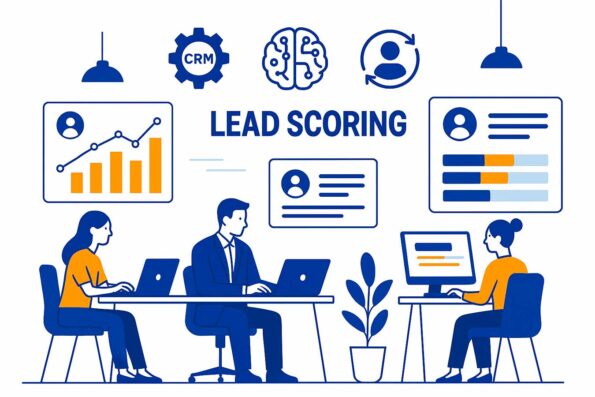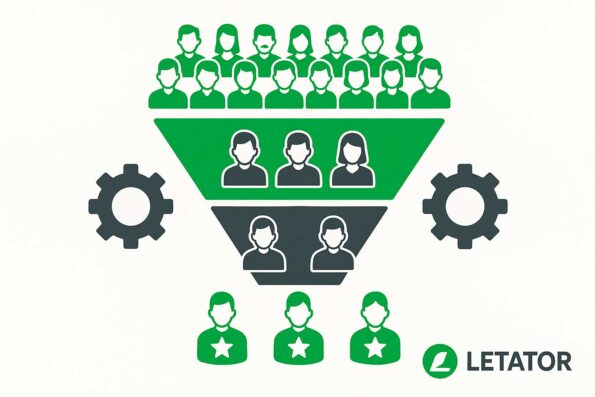With Lead Scoring, you can prioritize your business’s most valuable leads, streamlining your sales processes and maximizing the return on your marketing investments. Not every customer has the same value in digital marketing. Some simply visit your website, some fill out a contact form, and some are much closer to making a purchase. This is where Lead Scoring comes into play.
What is Lead Scoring?
👉 In short, it’s a method that measures the likelihood of potential customers making a purchase by scoring them based on their behavior, demographics, and interactions. This way, your sales team can dedicate their time to the most valuable customers.
In the fast-paced business world of 2025, the Letator™ Model not only measures this process, but also automates it, integrates it with CRM, and enables businesses to capture the right customer at the right time. 🚀

İçindekiler
ToggleWhy is Lead Scoring a Critical Strategy?
Have you ever wondered why some campaigns don’t generate sales despite receiving high traffic?
The answer is simple: Because not all leads have the same value. Lead scoring enables your business to use its resources efficiently, focusing on leads that are highly likely to convert into sales.
This approach not only translates to more sales but also higher ROI. With Letator™, this process is completely automated, data isn’t scattered, and your sales team doesn’t waste time.
Sales Teams Focusing on the Right Priorities
Lead scoring answers the question, “Who should you contact first?” for your sales team. This way, the team allocates their time to those most likely to buy, rather than those with low-probability leads.
Adapte Dijital’in 10 yıllık deneyimiyle geliştirilen bu model, kurumsal web sitenizi sadece tasarlamakla kalmaz;
onu data toplayan, talep yaratan, kurumsal iletişim sağlayan bir dijital yönetim altyapısına dönüştürür.
Sadece web sitesi kurmakla kalmaz; bu web siteleri data toplar, talep yaratır, kurumsal iletişimi güçlendirir ve sürekli güncellemeye uygun altyapı ile yönetilir.
Strengthening Marketing-Sales Alignment
Marketing teams generate traffic, while sales teams want conversions. Lead scoring bridges the gap between these two departments and provides a common success metric. 🤝
Increased ROI and Productivity
Prevents wasted resources. Allows you to see which campaigns are truly bringing in quality customers. This increases your return on investment (ROI). 📊
The Automated Scoring Advantage with Letator™
Manual scoring is time-consuming. The Letator™ Model automates the lead scoring process through behavioral data and CRM integration. 🚀
👉 Mini CTA:
“Set up your lead scoring strategy with Letator™ and double your sales team’s performance.”
What is Lead Scoring? (Definition and How It Works)
In short, it’s the process of measuring the likelihood of potential customers to purchase by assigning them scores based on specific criteria. These criteria include parameters such as behavioral data, demographic information, engagement level, and CRM integration.
This method allows businesses to easily understand which customers are most likely to make a sale, and sales and marketing teams align on the same goal. The Letator™ Model makes this process not only theoretical but also automatic and practical.
BehavioralScoring Based on Data
The pages users browse, the content they download, the emails they click, or the forms they fill out on your website indicate their interest in purchasing. This data plays a critical role in the scoring process.
The Impact of Demographic Data
Not every customer profile may be suitable for you. Demographic factors such as company size, industry, and job title determine a customer’s suitability for you during the lead scoring process. 🎯
Adapte Dijital’in 10 yıllık deneyimiyle geliştirdiği modellerle, kurumsal web sitenizi kurumunuzu/markanızı anlatan, tanıtan, güven yaratan, talep oluşturan bir dijital yönetim platformuna dönüştürür.
Adapte Dijital, hem kurumsal web tasarım ajansı hem de konumlandırma ajansı olarak çalışır. Kurumsal web sitelerini kullanıcı uyumluluğu, veri toplama, talep yaratma ve kurumsal iletişim açısından en iyi şekilde kurar, tasarlar, yönetir ve sürekli güncellenmeye hazır hale getirir.
Scoring by Engagement Level
Activities like social media interactions, email open rates, and webinar participation indicate the customer’s connection to your brand. The stronger this connection, the higher the score. 📈
Centralized Management with CRM Integration
Lead scoring alone isn’t meaningful. With CRM integration, scores are transferred to the sales team, the process is tracked, and conversions are recorded. This integration works seamlessly thanks to Letator™. ⚡
👉 Mini CTA:
“Want to see lead scoring in action in your own CRM system? Schedule a demo now with Adapte Dijital.”
Benefits of Lead Scoring for Businesses
Lead scoring isn’t just a scoring system; it’s a strategy that reshapes businesses’ sales and marketing processes. When implemented correctly, it increases efficiency and speed at every stage of the sales funnel. This saves teams time and makes campaigns more effective.
Lead scoring also directly improves the customer experience. This is because the content customers need is delivered at the right time. This approach both builds trust and leads to higher conversion rates. When combined with the Letator™ Model, these benefits are magnified exponentially. 🌟
Productivity for Sales Teams
The sales team knows their priority leads and allocates resources to the right people. This means faster closing sales and a higher success rate.
Optimizing Marketing Campaigns
Lead scoring shows which campaigns are truly bringing in quality leads. This way, budgets are allocated to the right places and marketing ROI increases. 📊
Improving Customer Experience
Providing customers with the right content based on their interests increases their commitment to the brand. This, in turn, creates customer loyalty. 🤝
Increased ROI and Profitability
Focusing on the right leads increases sales rates and accelerates the return on budget. This leads to a more profitable business. 💹
👉 Mini CTA:
“Optimize your sales and marketing processes with lead scoring. Increase your efficiency now with Letator™.”
5 Ways to Select the Right Customer with Letator
Success in the lead scoring process is not only about scoring, but also about managing these scores with the right strategies. The Letator™ Model guides businesses step-by-step through this process. Here are 5 ways to choose the right customer:
Analyzing Behavioral Data
Analyzing customers’ activity on your site, email interactions, and content consumption reveals how close they are to making a purchase. Letator™ automatically scores these behaviors to highlight the most sales-ready leads.
Checking Demographic Relevance
Not every lead is right for you. Letator™ filters out candidates who don’t fit your ideal customer profile by analyzing criteria like industry, company size, and location.
Measuring Engagement Density
Social media interactions, webinar participation, or free trial requests are indicators of customer interest. Letator™ aggregates this data and identifies high-potential leads. 📊
Centralized Management with CRM Integration
Manually collecting data from different channels is difficult. Letator™ brings all scoring together in a single dashboard, providing teams with a transparent view thanks to its CRM integration. ⚡
Using Predictive Analytics
AI-powered prediction helps predict which leads will buy and when. Letator™ learns from past data to predict future customer behavior. 🤖
👉 Mini CTA:
“Adapt these 5 steps to choosing the right customer to your business. Build a more efficient sales process today with Letator™.”
The Most Common Mistakes in the Lead Scoring Process
While it offers great opportunities for businesses, it doesn’t yield the expected results when implemented incorrectly. Instead of identifying the right leads, many businesses struggle with inaccurate data or view simply “more traffic” as success. This leads to a collapsed sales funnel. ⚠️
The Letator™ Model offers a systematic approach to minimizing these errors. With CRM integration, automatic scoring, and analytical reporting, learning from mistakes is accelerated and businesses move in the right direction.
Working with Incorrect or Incomplete Data
If the data entering your system is incorrect, your scoring will also be inaccurate. Incomplete forms, incorrect email addresses, or outdated demographic information reduce the reliability of lead scoring.
A Traffic-Only Approach
Getting too many visitors is always too muchIt doesn’t mean a single shot. Instead of focusing solely on numbers, you need to engage in conversion-focused lead scoring. 📉
Lack of CRM Integration
Lead scoring without a CRM leads to scattered information, disrupting the harmony between marketing and sales teams. Letator™ centralizes all data.
Wasting Time with Manual Scoring
Manual scoring increases time loss and the risk of errors. Letator™ provides automated and intelligent scoring, providing businesses with both speed and accuracy. ⚡
👉 Mini CTA:
“Are you making these mistakes? Build your lead scoring process on the right foundation with the Letator™ Model.”

Future Trends in Lead Scoring (2025 and Beyond)
Lead scoring is a business that shapes not only the present but also the future. It’s a strategic process. To succeed in customer management in 2025 and beyond, businesses need to adopt AI-powered, omnichannel, and personalized methods. Businesses that rely solely on numbers with outdated methods will fall behind the competition. ⚠️
The Letator™ Model has already established this new era. Thanks to AI-based scoring, predictive analytics, and advanced CRM integrations, businesses are becoming more powerful than ever in selecting the right customer.
AI-Powered Lead Scoring
Artificial intelligence analyzes customer behavior and captures signals missed by manual methods. This makes scoring faster, more accurate, and more scalable. 🤖
Predictive Analytics
Seeing which customers are most likely to buy in the future gives businesses the opportunity to take action proactively. Letator™ provides frameworks that model the future by learning from past data. 📊
Multi-Channel Integration
Customers interact not only on your website but also through social media, email, mobile apps, and chatbots. In 2025, lead scoring will require integration across all these channels. 🌐
Personalized Customer Journey
Every customer is different. In the future, scoring will not only be a scoring system, but also a personalized content and offer delivery system. This will elevate the customer experience to a whole new level. 🎯
👉 Mini CTA:
“Seize the future of lead scoring today. Get ready for 2025 customer management trends with Letator™.”
The Relationship Between Lead Scoring and the Sales Funnel
Lead scoring isn’t a standalone marketing tool; it’s an integral part of the sales funnel. Different scoring criteria come into play at each stage of the customer journey. If accurate measurement isn’t performed at every stage of the funnel, potential customer loss is inevitable.
The Letator™ Model integrates the TOFU (awareness), MOFU (interest), and BOFU (conversion) stages of the sales funnel with lead scoring, providing businesses with a clear roadmap. This way, you’ll get not only more leads, but also higher quality leads.
TOFU: Lead Scoring in the Awareness Stage
At this stage, potential customers become familiar with the brand. Behaviors such as website visits, content downloads, and social media interactions are included in the scoring. 🎯
MOFU: Lead Scoring in the Interest Stage
During the interest stage, customers develop a stronger connection with the brand. Criteria like webinar attendance, email open rate, and demo requests increase lead value. 📈
BOFU: Lead Scoring at the Conversion Stage
The customer is now very close to making a purchase. A quote request, a price inquiry, or direct communication with the sales team are strong signals for this stage. ⚡
Funnel Based Scoring with Letator™
Letator™ tracks each stage of the sales funnel separately. With funnel-based scoring, teams get a clear view of the customer journey and highlight those most likely to purchase.
👉 Mini CTA:
“Power up your sales funnel with lead scoring. Control every step from TOFU to BOFU with the Letator™ Model.”
Industry-Based Lead Scoring Use Cases
Not every business can acquire customers using the same methods. The needs of SMEs differ from those of large corporations. Similarly, entrepreneurs focus on quick results. Lead scoring adapts to these differences, offering solutions tailored to each sector. This is where the Letator™ Model comes into play; it meets the needs of businesses of all sizes with its flexible, adaptable, and automated scoring structures.
This way, businesses not only get more leads, but also higher-quality leads tailored to their specific industry needs. 🎯
Lead Scoring Example for SMEs
SMEs often look for high efficiency with a low budget. Letator™ measures content marketing and social media engagement, highlighting prospective buyers for SMBs.
Lead Scoring for Enterprise IT Companies
The IT buying process is long, and technical documentation is paramount. Letator™ filters real buyers by scoring whitepaper downloads, product demo requests, and technical webinar attendance. ⚡
Lead Scoring for Entrepreneurs
Entrepreneurs need speed. Letator™ scores short-term campaign engagements, ad conversions, and quick lead forms to highlight fast sales opportunities. 🚀
Lead Scoring for Businesses Expanding into Global Markets
Multiple languages and diverse cultures come into play in the international market. Letator™ identifies global leads by analyzing local content consumption, interactions from different regions, and omnichannel CRM integration. 🌍
👉 Mini CTA:
“No matter what industry you are in, the Letator™ Model offers you special lead scoring solutions.”

The Importance of Data Quality in Lead Scoring
The success of lead scoring depends on the accuracy and up-to-dateness of the data used. If businesses use inaccurate or incomplete data for scoring, the results will be misleading. This wastes sales teams’ time and reduces the return on marketing investments. ⚠️
In 2025, data quality is not just a choice, but a must for businesses. The Letator™ Model eliminates inaccurate data from the system through CRM integration and automatic data cleansing algorithms. This makes scoring processes more reliable.
Problems Caused by Missing Data
Missing email addresses, unfilled forms, or outdated phone numbers lead to incorrect customer prioritization.
Risks of Incorrect Data
Incorrectly entered information causes businesses to allocate time and resources to the wrong people. This causes the sales funnel to break down.
Data Cleansing and Update Process
Letator™ automatically cleans data thanks to its CRM integration. This creates up-to-date, reliable, and usable databases. 🔄
Reliable Scores with Accurate Data
Accurate and reliable data unlocks the true potential of lead scoring. This way, businesses capture not only more but also higher quality sales opportunities. 📊
👉 Mini CTA:
“Improve your data quality and ensure the accuracy of your lead scoring process. Get started with Letator™.”
Demand Generation Process: Letator by Funnel Stages Approach
The Power of Lead Scoring and Automation
Lead scoring with traditional methods is often done manually.This leads to filling out spreadsheets and making decisions based on guesswork. This approach not only wastes time but also increases the risk of errors. 🚫
Success for businesses in 2025 will be made possible through automation. The Letator™ Model surpasses manual scoring methods, making the lead scoring process faster and more reliable thanks to automatic data analysis, CRM integration, and real-time updates.
Challenges of Manual Methods
Manual scoring is both tedious and prone to subjective errors. It often creates inconsistencies between different teams.
The Advantage of Automatic Scoring
Automation processes data in real time and keeps lead scores constantly updated. This allows businesses to prioritize in real time. ⚡
CRM and Marketing Automation Integration
Automation provides not only speed but also integration power. Automatic scoring combined with CRM systems enables marketing and sales teams to work on the same database. 📊
Intelligent Automation with Letator™
Letator™ doesn’t just provide scoring; it also makes predictions using AI-powered algorithms. This gives businesses a competitive advantage by predicting which leads will convert in the future. 🤖
👉 Mini CTA:
“Automate your process. Eliminate manual errors and increase your conversions with Letator™.”
Lead Scoring and Customer Experience
It’s not just a tool for sales teams; it’s also a strategy that directly impacts customer experience. Because accurate scoring allows customers to receive personalized content and offers based on their interest levels. This approach helps meet customer needs and increases brand loyalty. 🤝
The Letator™ Model analyzes customer behavior in real time, enabling businesses to deliver personalized experiences. This makes lead scoring not only a sales prioritization tool but also a way to build customer loyalty.
Delivering the Right Content at the Right Time
It identifies the stage customers are in and ensures they are presented with the right content exactly when they need it.
Personalized Communication Channels
Data from different channels, such as email, social media, or mobile apps, is analyzed to establish communication with the customer through the most appropriate channel. 📱
Increasing Customer Satisfaction
Getting the right offer at the right time increases customer trust in the brand. This means gaining loyal and long-term customers. 🌟
Experience-Driven Scoring with Letator™
Letator™ considers not only sales data but also customer experience metrics. This creates a positive impact on the entire customer journey. ⚡
Customer Acquisition Methods in 2025: Traditional Methods vs. the Digital Letator Model
👉 Mini CTA:
“Transform your customer experience with lead scoring. Gain loyal customers with the right offers at the right time with Letator™.”
Best Practices for Successful Lead Scoring
When implemented correctly, it maximizes businesses’ sales and marketing efficiency. However, this requires not only technology but also a disciplined strategy. Best practices make the lead scoring process reliable, sustainable, and results-oriented.
The Letator™ Model systematically delivers these practices to businesses. It provides a powerful approach based on understanding customer behavior, along with data analytics, CRM integration, and automation.
Defining Clear Criteria
The foundation of successful lead scoring is clear criteria. Which behavior deserves which score? Is demographics more important or is engagement more important? These questions must have clear answers.
Aligning Marketing and Sales Teams
Scoring isn’t just a marketing job. Sales teams should also be involved in the process. Letator™ provides complete alignment between the two teams with a common dashboard.
Continuously Test and Improve
Your scoring model shouldn’t be static. As customer behavior changes, criteria should be reviewed. Continuous testing and improvement yields current and accurate results.
Empowering with Automation and AI
Remaining limited to manual methods is no longer possible. Automation and AI make lead scoring not only faster but also more accurate. 🤖
👉 Mini CTA:
“Adapt best practices to your business. Optimize your lead scoring process with the Letator™ Model.”
How to Collect Leads? 5+1 Letator Techniques for Building Your Digital Infrastructure
Frequently Asked Questions (FAQ)
What is lead scoring?
Lead scoring is a tool that identifies potential customers based on their demographics, behavior, and interactions. It’s a method that measures the likelihood of a lead being purchased by assigning points.
Why is lead scoring important?
Because not all leads have the same value. It prioritizes the leads closest to sales, ensuring the proper use of resources.
How is lead scoring done?
Scoring is based on behavioral data (website visits, email interactions), demographic information (industry, company size), engagement level, and CRM integration.
What’s the difference between manual lead scoring and automatic lead scoring?
Manual methods are slow and error-prone. Automatic methods provide faster and more reliable results by processing data in real time with systems like Letator™. ⚡
How does lead scoring affect the customer experience?
Accurate scoring ensures that content is presented to customers based on their interest levels. This increases customer satisfaction and loyalty.
In which sectors can lead scoring be used?
It can be applied in every sector, from SMEs to corporate IT companies, from entrepreneurs to global brands. Letator™ offers adaptable solutions for different industries. 🌍
Does lead scoring increase ROI?
Yes. Focusing on the right leads increases sales conversions and ensures more efficient use of the marketing budget. This, in turn, increases ROI. 📈
👉 Mini CTA:
“Would you like to learn about lead scoring solutions tailored to your business? Contact Adapte Dijital and learn more about the Letator™ Model.”
📌 About This Content
This article is about lead scoring, one of the most critical needs of businesses by 2025. It is designed to explain scoring (customer scoring) processes and increase the efficiency of sales and marketing teams through correct practices.
Content:
- What is lead scoring and how is it done?
- Ways to select the right customer with the Letator™ Model
- Industry-based use cases and future trends
- The power of automation and its effects on customer experience
- Successful implementation tips and frequently asked questions
Discussed in detail.
At Adapte Digital, we help businesses improve their sales funnel performance, correctly prioritize leads, and automate their processes through CRM integration with the Letator™ Lead and Demand Collection Model.
For more information, please visit the official website of 👉 Adapte Dijital and review our Corporate Presentation page.
You can also watch our short introductory video about Adapte Dijital: Digital Consulting Agency:
🎥 YouTube Video:







